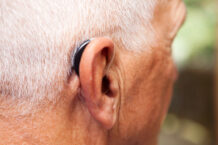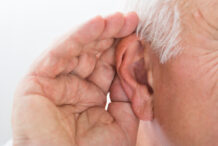Tinnire: Latin for “to ring”
Described as ringing in the ear, tinnitus can also sound like buzzing, crickets, hissing, whistling, screeching, clicking, static, roaring, swooshing, a dial tone, or pulsing. However it manifests, with very few exceptions it’s a phantom noise; the person with tinnitus is hearing sound that is not actually there. The condition can occur in one or both ears and can be intermittent or continuous. It is estimated to affect 10 to 15 percent of the adult population in the United States—tens of millions of people.
It’s not a disease but, rather, a symptom of something gone awry in the auditory system. That system includes not just the ears but also the auditory nerve that connects the inner ear to the brain as well as parts of the brain that process sound. Another way of putting it: Tinnitus means there’s a glitch, or misfire, in the way the ear and the brain communicate with each other.
The illusion of unremitting noise that characterizes almost all cases of tinnitus occurs mostly in people who have experienced hearing loss related to advancing age or noise trauma—or both. Active soldiers and veterans who have endured the loud booms of explosions and gunfire are predisposed to developing tinnitus, as are people who work in factories where the machinery is loud enough that they have to yell to their co-workers to be heard. Four in five people who visit tinnitus clinics do not have normal hearing.
Others who are predisposed include people who have heart disease, hypertension, or diabetes, as well as those with Meniere’s disease, other diseases of the ear, or temporomandibular joint (TMJ) disorders.
A history of anxiety or depression is yet another predisposing factor, as is stress, which can trigger a case of tinnitus, or at least make it much worse. One of our editorial board members, Dr. Glen Petersen, went from having a mild case of tinnitus to a very severe, almost debilitating one when the anniversary of his father’s death coincided with his wife’s birthday. Following the birthday party, while his wife was driving their elder son back to college, he was home alone with his younger son, who is autistic and with whom he could not have a conversation to share his emotions about these two life events that marked the inexorable passage of time. That was exactly when his tinnitus ramped up. (For more on Dr. Petersen’s condition and how he managed it, see his guest editorial.)
The impact of stress should not be underestimated. Negative life events such as mandatory retirement and divorce may be associated with tinnitus, and a study that surveyed more than 2,000 people with the condition found that stress is almost as great a predictor of tinnitus as occupational noise, particularly for the transition from mild to severe tinnitus. Of course, the stress of tinnitus itself often leads to more stress and makes the perception of the sound worse; it becomes a vicious cycle that can cause difficulty sleeping, depression, and problems focusing.
To date, while researchers have identified many conditions associated with tinnitus, for the most part the root causes of tinnitus are still not understood. Granted, there are a few instances in which a direct cause can be found and treated, resulting in a reversal of the condition. For example, certain drugs are ototoxic, including aspirin, some antibiotics, and certain cancer drugs; if someone regularly takes relatively high doses of aspirin and develops tinnitus, discontinuing the drug will usually resolve the problem. A buildup of earwax (cerumen) to the point that it is impacted in the ear canal can also cause tinnitus, and having the wax removed can put an end to the noise. Treating ear infections and tumors can potentially lead to a cessation of tinnitus, too.
For those reasons, anyone experiencing tinnitus that lasts more than a short time would do well to see an ENT doctor—an otolaryngologist. The doctor can look for a possible cause and, if one is found, a solution.
But because finding a treatable cause is the rare exception rather than the rule, treatment is usually not about a cure but about managing the condition so it remains in the background, so to speak.
Tinnitus management
How troubled people feel by their tinnitus varies. For some, the sound—and the bother of it—is minimal. For others, the phantom noise is so front-and-center that their quality of life is significantly impaired. The good news is that there are several therapeutic approaches that can minimize the impact of tinnitus. Often, an audiologist can help tailor a solution.
Hearing aids. For many people with hearing loss, hearing aids work to reduce tinnitus. It makes sense. If you can hear soft conversation better, along with incidental noises like doors closing and the television playing in the other room, that’s going to dampen the “insistence” of the tinnitus. Some hearing aids can also be programmed to generate pleasant sounds that help mask the tinnitus. These sounds can be in the form of soft music or random pleasant sounds like “Shhhhh.” They don’t completely drown out the tinnitus but make it less perceptible.
Sound generators. You can buy sound generators to place in your ear (like hearing aids) or on a tabletop. There are also apps you can download to your cellphone that generate soothing sounds. The sound of waves or a gentle rainfall can help relax someone with tinnitus—sometimes making it much easier to fall asleep.
Behavioral therapies. As the American Tinnitus Association explains, what makes tinnitus truly burdensome is not the loudness of the sound perceived but “the negative psychological and cognitive reactions patients have in response to tinnitus. In other words, the patient’s emotional response is the key factor in whether the tinnitus is perceived as bothersome or non-affective, deeply distressing or a minor annoyance.” That’s why behavioral therapies, including cognitive behavioral therapy, that address ratcheting down emotions surrounding the condition can be highly effective. (Even just learning that tinnitus is not dangerous can be therapeutic.) A Cochrane analysis of eight trials looking at almost 500 people with tinnitus found that cognitive behavioral therapy improved quality-of-life scores and diminished depression scores compared with no treatment.
Anti-anxiety or antidepressant drugs. For people whose tinnitus is severe and has not been helped with other therapies, anti-anxiety medications, including alprazolam, can be of help, as can antidepressants. They blunt the emotional impact of the condition, which can be debilitating for some people. In some cases, a short course of such drugs may be enough to take the edge off for the long term.
Stress reduction. Some tinnitus groups cite stress reduction in the forms of relaxation exercises, biofeedback, and measured breathing as potentially helpful in quieting the burden of tinnitus.
Some researchers have noted that what does not help is being told to just “live with it.” Do not accept that “prescription.” For those whose tinnitus affects quality of life, help in the form of hearing aids, sound maskers, behavioral therapies (and even just talking with others who have learned to adapt to the condition), and sometimes medication, can make the condition a “nothing burger,” as Dr. Petersen now refers to it.





